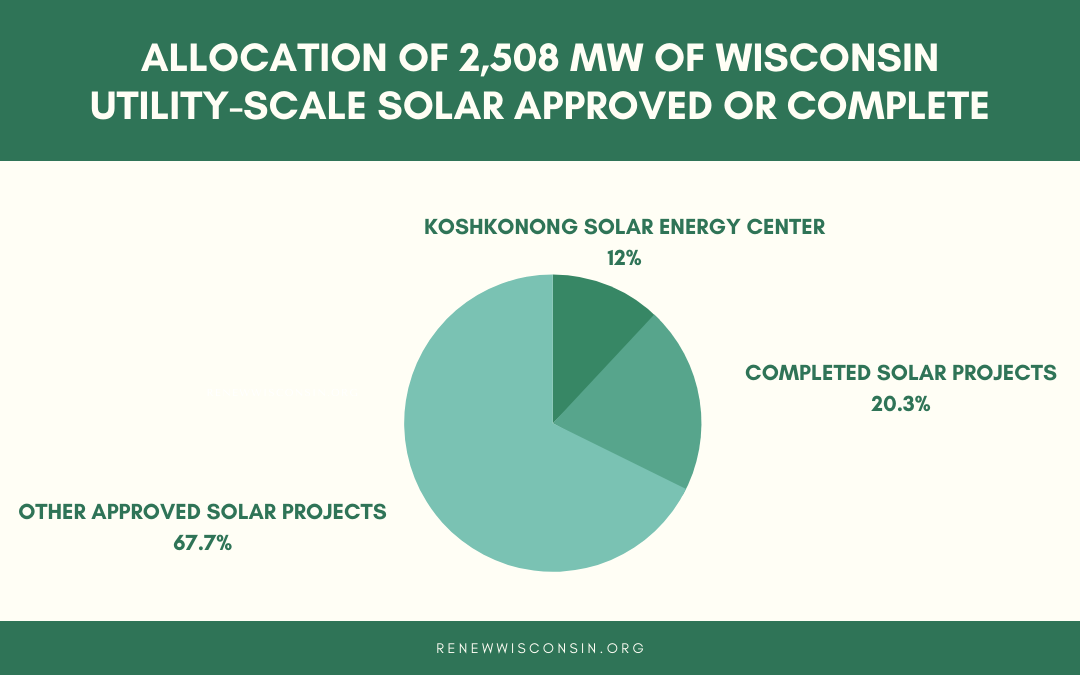
by Heather Allen | Apr 12, 2022 | Energy Storage, PSC Priorities, Public Service Commission, Solar, Utilities, Utility Scale
The Wisconsin Public Service Commission (PSC) approved the construction of the 300-megawatt (MW) Koshkonong Solar Energy Center in early April.
Developed by Chicago-based Invenergy LLC, this solar project will provide enough emission-free electricity to power 60,000 Wisconsin homes. It will become one of Wisconsin’s largest renewable energy generators, representing 12% of Wisconsin utility-scale solar projects that have been completed or approved as of today.
The Koshkonong Solar Energy Center will be located in southeast Dane County. In addition to the 300 MW of solar power, the project will feature a 165 MW battery storage component to help bolster grid reliability. WEC Energy Group and Madison Gas and Electric intend to buy the plant for $649 million.
“This project accelerates the state’s and the region’s transition to clean energy,” said Heather Allen, Executive Director at RENEW Wisconsin. “With enough capacity to provide one-fourth of the local solar needed to meet Dane County’s Climate Action Plan, Koshkonong’s approval is a major milestone in the transition to energy independence for the region.”
When energized, the project will generate $1.2 million per year in new revenue for local governments, in addition to lease payments to local landowners. Construction is expected to begin later this year and will likely become operational in 2025.
“The energy storage component of the project will provide up to 660 megawatt-hours of energy storage per day, or approximately the equivalent battery storage capacity of 6,000 electric vehicles,” Allen added. “Battery energy storage adds more flexibility to the project, allowing for energy use when it is needed most.”
Koshkonong is the fourth solar generation project proposed by Invenergy to receive construction approval from Wisconsin regulators and the third to be combined with an energy storage component. The four solar projects developed by Invenergy—Badger Hollow, Paris, Darien, and now Koshkonong—will comprise 1,050 MW of generating capacity when completed. The energy storage facility at Koshkonong will be the largest of its kind in Wisconsin.
In a separate proceeding, WEC Energy Group and Madison Gas and Electric seek permission to add the Koshkonong Solar Energy Center to their growing portfolio of renewable generating plants. The PSC will likely rule on this application before the end of this year.
In the technical hearing leading up to the PSC’s decision, RENEW provided expert testimony documenting the public benefits to be delivered by the Koshkonong solar and storage project. These benefits include:
- Displacing fossil generation with a zero-carbon source of electricity over its 30-year+ lifetime;
- Providing firm capacity at a Dane County location for replacing the 1,100 MW Columbia coal-fired power plant scheduled for retirement in 2024; and
- Supporting Wisconsin’s farm economy through lease payments to participating landowners and new revenues to local governments hosting the project.
Wisconsin currently has over 510 MW of completed utility-scale solar projects with nearly 2000 MW more approved. This upward trajectory of utility-scale solar projects will help Wisconsin meet its 100% carbon-free goals.
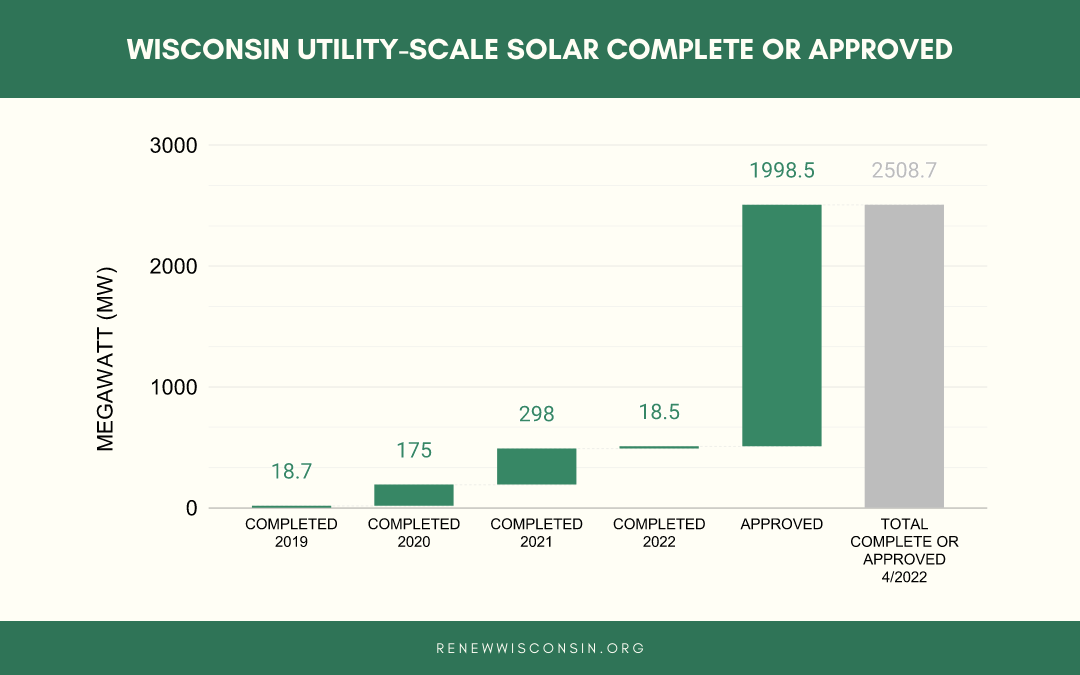
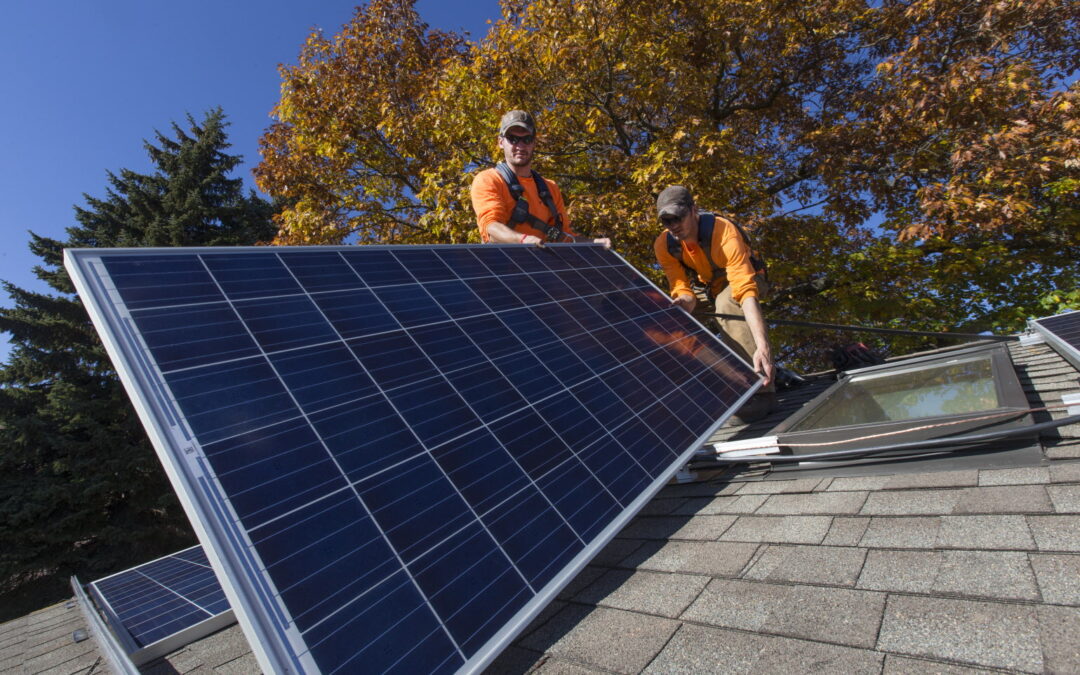
by Sam Dunaiski | Mar 24, 2022 | Local Initiatives, Renewables, Solar, Utilities
On Tuesday, March 22, 2022, the City of Madison and RENEW Wisconsin announced the 2022 MadiSUN residential solar group buy program. MadiSUN is for Madison-area homeowners looking to install solar-electric systems.
In its seventh year, the program offers Dane County homeowners easy access to qualified solar contractors at a competitive price. MadiSUN has spurred approximately $3.5 million in solar energy investments since 2016 and has added over 1,000 kilowatts of renewable electricity to the local electric grid. Over 200 homes in the Madison area have installed solar through the program.
“The MadiSUN program helps make it easy for residents to select an installer and get a cost-effective and high-quality solar system for their home,” said Stacie Reece, Sustainability Program Coordinator for the City of Madison. “Each additional rooftop installation gets us closer to our goal of 100% renewable energy for the City.”
Two local solar installation firms, Arch Solar and Full Spectrum Solar won a competitive bidding process and will design and install arrays for MadiSUN participants. Many solar design firms across Wisconsin anticipate a busy year for installations as Federal Investment Tax Credits begin to wind down in 2023.
“With tax credits at 26%, and utility rates increasing across the state, 2022 is a great year to go solar,” said Stanley Minnick, Head of Sales at Arch Solar, one of the participating contractors for MadiSUN. “This will likely be a record-setting year for residential solar.”
MadiSUN also provides homeowners with multiple options for financing. Loans are available through greenpenny bank and the Clean Energy Credit Union. However, homeowners may choose any financing mechanism they prefer, including home equity lines of credit or loans from other banks.
“Residents of Dane County can count on greenpenny for fast, easy, and affordable financing for their solar projects,” said Jason MacDuff, President of greenpenny. “Our team works hard to find a loan term within our residential solar program that allows for the borrower to trade their current electric bill for a solar financing payment.
In addition to financing and access to local solar contractors, MadiSUN participants have access to additional education sessions, which help them understand the benefits of at-home solar energy.
“Modern solar electric systems are still relatively new technology to many Wisconsin homeowners,” stated Sam Dunaiski, Distributed Resources Director for RENEW Wisconsin and administrator of the MadiSUN program. “The main goal of MadiSUN is to make going solar easy and affordable for any Madison area resident. We want to make sure everyone in the community understands how beneficial solar energy can be.”
Residents can receive a complimentary solar assessment by visiting madisunsolar.com and filling out the “I’m Interested” form. Applications for the Group Buy program must be submitted by August 31, 2022.
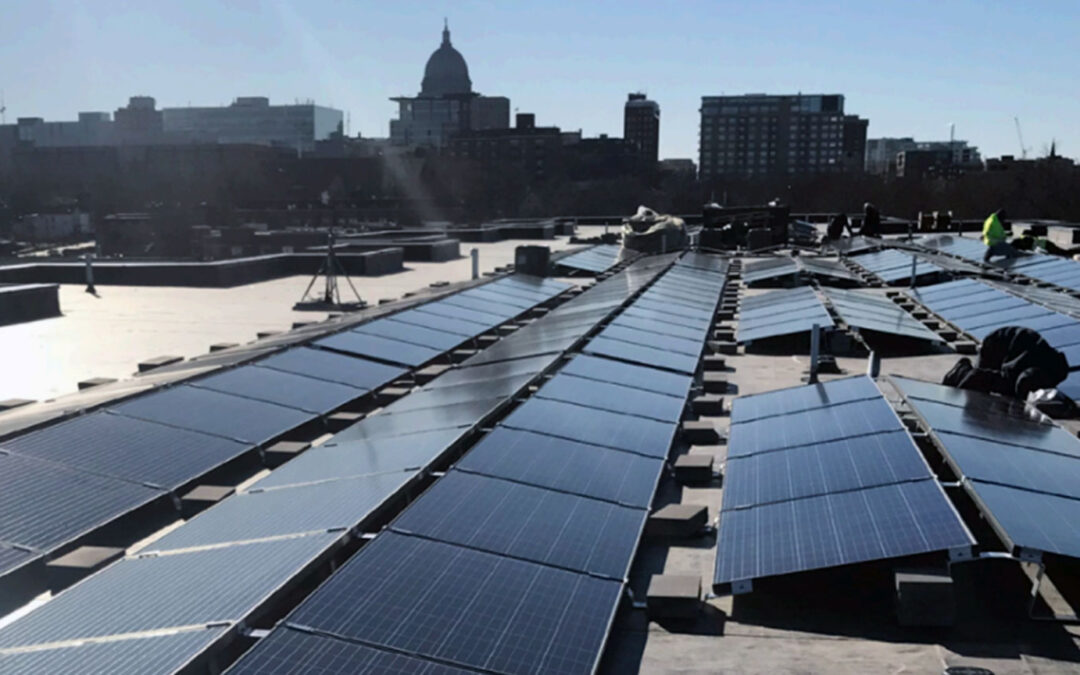
by Jim Boullion | Feb 16, 2022 | Policy, Press Release, Solar, Utilities
The Wisconsin State Senate demonstrated unanimous support for clean energy today with the passage of SB 692, which updates Wisconsin’s Property Assessed Clean Energy (PACE) program. The bill now moves to the State Assembly, where similar bipartisan support could pass the bill before the end of the session.
“We are excited to have bipartisan, unanimous support for this clean energy financing option which will help Wisconsin businesses shift to clean energy and drive economic investment. We thank Senator Cowles for introducing this legislation which demonstrates the broad appeal of common-sense clean energy solutions,” said Heather Allen, Executive Director of RENEW Wisconsin.
PACE financing creates a mechanism for commercial, industrial, health care, agricultural, nonprofit, and multifamily property owners to obtain low-cost, non-recourse financing for up to 100% of the cost of energy efficiency and renewable energy improvements. Financing options up to 30 years yield positive cash flows and increase the net operating income for commercial and industrial building owners. PACE loans are attached to the property, not the person, allowing the remaining cost of those improvements to transfer to a new owner if the property is sold.
SB 692 will improve access to PACE financing in Wisconsin by adding clarity and expanding eligibility.
Among other changes, the legislation:
- Expands the type of projects that may be financed to include energy reliability improvements, weather-related resiliency projects, electric vehicle charging infrastructure, and stormwater control measures.
- Defines the term of the repayment period, clarifying that financing may be repaid through a lien, and ensures that all mortgage holders provide written consent before the issuance of funding.
- Removes the requirement for energy and water savings to exceed project costs and would instead require that the owner obtain a third-party assessment of the anticipated energy and water cost savings from the proposed project and provide confirmation of proper installation after work is completed.
- The bill also prohibits PACE financing for residential units of less than five units. Wisconsin does not currently have a residential PACE program. In the few states that have tried implementing a residential program, problems developed when individual homebuyers did not fully understand the implications of a PACE loan.
“Regular updates to our energy laws and financing programs like PACE allow Wisconsin’s citizens to benefit from the many advancements in clean, affordable renewable energy and energy efficiency technologies,” said Jim Boullion, Director of Government Affairs.
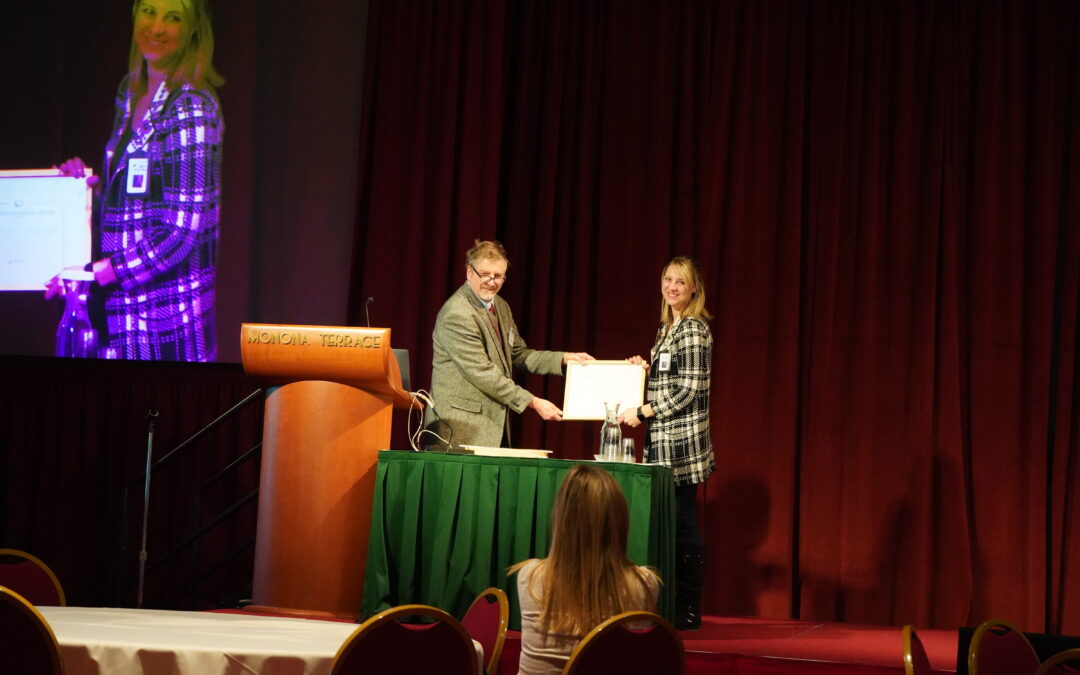
by RENEW Wisconsin | Jan 31, 2022 | Policy, Press Release, Solar, Utilities
During its eleventh annual Renewable Energy Summit, titled “All Roads Lead to Clean Energy,” RENEW Wisconsin honored individuals and businesses who have made significant and lasting advances in clean energy development here in Wisconsin. Presented by greenpenny, Invenergy, and NextEra Energy Resources, the summit took place Thursday, January 27, 2022, at Monona Terrace in Madison. Due to the ongoing coronavirus pandemic, this year’s Summit featured a mix of in-person and online attendees and speakers.
In keeping with the program theme, summit presenters spotlighted the intertwining pathways leading Wisconsin closer to the zero-carbon goals embraced by state and local leaders, influential businesses, schools, and nonprofit organizations. Featured speakers included Commissioner Tyler Huebner (Wisconsin Public Service Commission) and Kari Lydersen (author and journalist).
During the summit, RENEW presented awards to a trio of clean energy businesses and champions in recognition of the leadership they’ve demonstrated in the years leading up to the present occasion. They are:
2022 Awardees
Clean Energy Business of the Year: Arch Solar, Plymouth
Arch Solar, a Plymouth-based company, founded in 2003, has become the largest full-service solar contractor in Wisconsin, with about 90 employees. Arch connects veterans to solar energy, primarily through its efforts to place them in its workforce. It is also a certified Women’s Business Enterprise, one of the few in the clean energy field.
Clean Energy Educator of the Year: Kenneth Walz, Madison Area Technical College
Kenneth Walz is a nationally recognized leader in developing coursework and training materials to help post-secondary students acquire skills for entry into the renewable energy workforce. As director for the Center for Renewable Energy Advanced Technological Education, Ken has enabled Madison Area Technical College to become the state’s preeminent energy education center and laboratory. Ken has also been an effective internal champion for “solarizing” all Madison College’s campuses. With the recent installation of a 133-kilowatt array at its Watertown branch, the Madison College system now hosts more solar generating capacity than any other school or local government in Wisconsin. In 2020, U.S. EPA bestowed a Green Power Leadership Award to Madison College for incorporating clean energy into its curriculum and operations.
Clean Energy Trailblazer of the Year: Susan Millar, 350 Madison
Susan Millar is a member of 350 Madison, a local citizens group catalyzing meaningful public and private actions to address climate change threats. She recently launched an ambitious effort to re-engineer her 90-year-old house to become an all-electric residence. Susan converted her conventionally heated house to one that runs on an all-electric, solar-assisted energy platform. She disengaged from a convenient but carbon-intensive heating source to rely on electric heating appliances and technologies instead. Susan’s house has been gas-free since September 2021.
This year’s Summit program also drew attention to other milestones and notable achievements in 2021, including the following:
- The Public Service Commission (PSC) approved six large solar projects—Wood County, Grant County, Onion River, Darien, Springfield, and Apple River—that will add 950 megawatts (MW) of solar power to Wisconsin’s electric generation portfolio.
- The PSC also approved applications from Alliant-Wisconsin Power and Light and Xcel-Northern States Power of Wisconsin to add a combined seven solar farms totaling 764 MW to their respective power plant fleets.
- Madison Gas and Electric completed its largest Renewable Energy Rider project to date. Located in Fitchburg, the 20 MW O’Brien Solar Fields project serves seven customers, including the State of Wisconsin and the University of Wisconsin-Madison.
- In partnership with the Couillard Solar Foundation, RENEW’s Solar for Good program issued grants for leveraging the installation of 1.27 MW of solar capacity serving 26 nonprofit-owned entities across the state.
- The first combined solar and microgrid project, serving the Bad River Tribal reservation in Ashland County, was placed in service. Project partners included a local nonprofit, Cheq Bay Renewables, and Menasha-based EnTech Solutions, the contractor that designed the project for the tribe.
- Employing the group purchase model, solar contractors teamed up with nonprofits and local governments to install 1,887 kW of solar capacity to 260 residential customers across the state.
This annual event featured an exposition hall, breakout sessions, and industry professionals discussing the current and future opportunities for advancing renewable energy in Wisconsin.
Click here for more information on the 2022 Summit program agenda, speakers, and registration.
This year’s Summit was supported by over 100 sponsors including greenpenny, Invenergy, NextEra Energy Resources, Alliant Energy, Arch Electric, ATC, Couillard Solar Foundation, Eagle Point Solar, OEI (Wisconsin Office of Energy Innovation), Savion, Stantec, Boldt, CED Greentech, EDF Renewables / Distributed Solutions, Foley & Lardner LLP, Generac, Michael, Best and Freiderich, MREA, Northwind Solar, OneEnergy, REC Group, SC Johnson, Steigerwaldt Land Services, SunPeak, Focus on Energy, AVID Risk Solutions, Carlson Electric, Braun Intertec, Current Electric, Dane County Office of Energy and Climate Change (OECC), Endries Solar and Electric, Entech Solutions Inc, Full Spectrum Solar, Glow Solar, Good Steward Consulting, HellermannTyton, Ingeteam, JCG Land Services Inc, WI K-12 Energy Education Program, Keyes & Fox, Madison College, Milwaukee Shines, muGrid Analytics, National Grid, Nautilus Solar, Pines Bach, PRC Wind, Ranger Power, Ruekert- Mielke, Stone House Development, SunBadger Solar, TRC, Werner Electric, WIDRC, Xcel Energy, Ayres Associates, Chint Power Systems (CPS), Michael J. Allen, EOR, Kapur & Associates, Legacy Solar Cooperative, McKinstry, Midwest Solar Power, Northeast Wisconsin Technical College, Oconomowoc Realty, Organic Valley, PACE, Sustain Dane, Trillium Construction, Vanguard Real Estate Solutions, Westphal & Company, Inc., Wisconsin Clean Cities, Wisconsin Conservative Energy Forum, All Energy Solar, Audubon Great Lakes, Aurora Solar, City of Madison, Clean Fuel Connects, Clean Wisconsin, Construction Business Group (CBG), Convergence Energy, Eland Electric, EMCS, Energy Analysis and Policy – Nelson Institute for Environmental Studies, Energy News Network / Midwest Energy News, Ethos Renewable Energy, Equix, Inc, GDS Associates, Gundersen Health System, HGA Architects and Engineers, JDR Engineering, Local 139 Operators, North Central States Regional Carpenters Council, Nokomis Energy, Samsung Renewable Energy, Solar Connection, Summit Ridge Energy, UA Local 400 Plumbers & Pipefitters, UW Office of Sustainability, WES Renewables (Engineering), Westwood, Wisconsin Academy of Sciences, Arts and Letters, Wisconsin Energy Institute, Wisconsin Health Professionals for Climate Action, WI Sustainable Business Council, and WPPI Energy.
About RENEW Wisconsin
RENEW Wisconsin is a nonprofit organization that promotes renewable energy in Wisconsin. We work on policies and programs supporting solar, wind, biogas, local hydropower, geothermal energy, and electric vehicles. More information can be found on RENEW’s website: www.renewwisconsin.org.
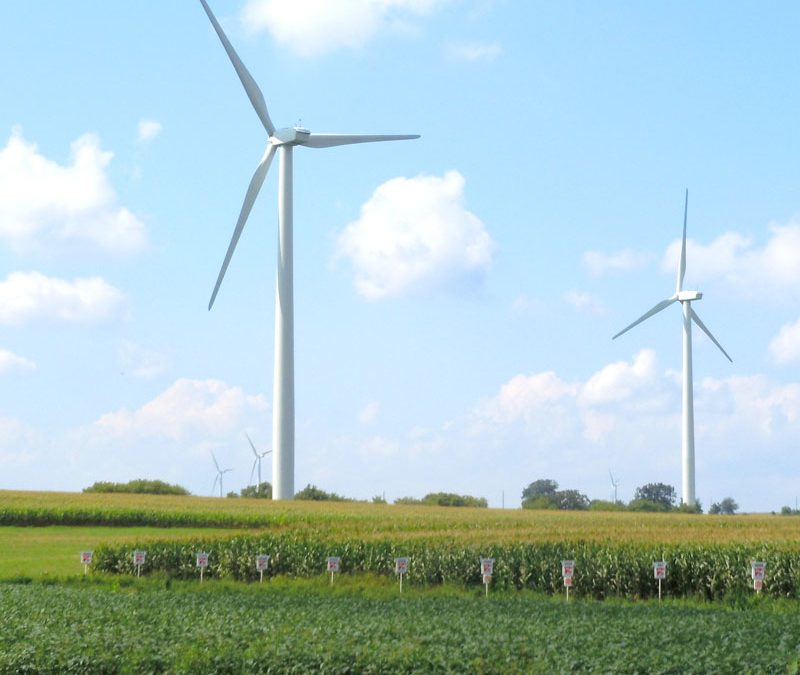
by Michael Vickerman | Jan 7, 2022 | Policy, Utilities, Utility Scale, Wind
A 28-turbine wind power project in Grant County will soon become a utility-owned source of clean electricity, thanks to a Public Service Commission of Wisconsin (PSCW) approval.
With this approval in hand, construction of the Red Barn Wind Energy Center should commence this spring and proceed quickly to completion before the year’s end. Once Red Barn’s 28 turbines begin generating power, Green Bay-based Wisconsin Public Service Corporation (WPS) and Madison Gas and Electric (MGE) will assume ownership of the project. WPS’s project share will be 90%, while MGE will own the remaining 10%.
With a generating capacity of 91.6 megawatts (MW), Red Barn is expected to produce approximately 300,000 megawatt-hours annually. That quantity of clean electricity will rival the annual output from Badger Hollow 1, a 150 MW solar farm located 10 miles east in neighboring Iowa County. WPS and MGE also co-own Badger Hollow 1, which began operating in December 2021.
“The evidence presented by both utilities and project supporters was powerful and unambiguous. Red Barn will be an economically attractive source of zero-fuel cost, zero-emission electricity that will produce savings for Wisconsin ratepayers and reduce power plant emissions, including greenhouse gases for years to come,” said RENEW Wisconsin Policy Director Michael Vickerman.
Red Barn’s original developer, Minnesota-based Project Resources Corporation (PRC), secured a conditional use permit from Grant County in July 2019. The siting permit granted to Red Barn was the first issued by a local government in this state since the Wind Siting Rule (PSC 128) took effect in 2012.
PRC subsequently sold the rights to develop Red Barn to ALLETE Clean Energy, another Minnesota-based energy company, which will build the wind farm before transferring it to WPS and MGE for an estimated $162 million.
Vickerman added: “RENEW commends Project Resources Corporation for blazing the trail here, working with willing landowners as well as accommodating neighbors and local officials to assemble and shepherd a wind power project from conception to siting approval, sparking no discernible opposition in the process.”
Red Barn will also be the first Wisconsin-based wind energy power plant to be added to the generation portfolio of any Wisconsin investor-owned utility since We Energies’ 162 MW Glacier Hills project started producing power in late 2011. Since then, only one utility-scale wind farm, the 99 MW Quilt Block project in Lafayette County, has come online. Quilt Block has been generating power for sale to Dairyland Power Cooperative since 2017.
Throughout Red Barn’s operating life, Grant County and the Towns of Wingville and Clifton will receive a combined $368,000 in utility local aids each year.
In 2020, wind projects located in Wisconsin accounted for 2.4% of the state’s electricity supply, according to the PSCW.
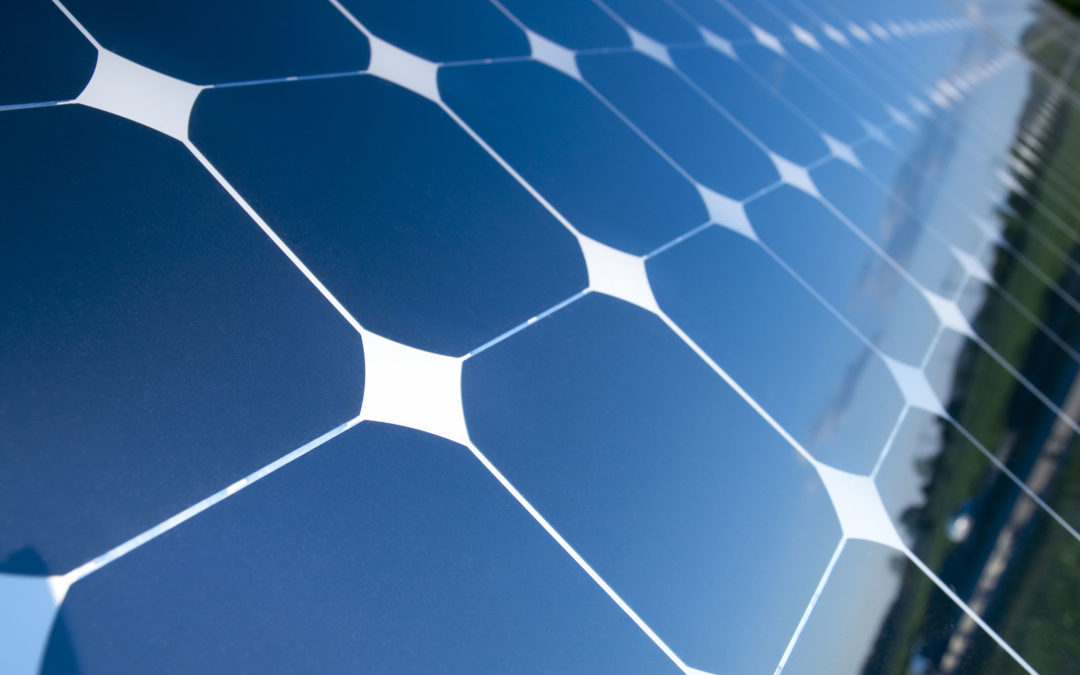
by Jodi Jean Amble | Oct 13, 2021 | Policy, Press Release, Solar, Utilities
Today, Senator Rob Cowles (R – Green Bay) and Representative Rachael Cabral-Guevara (R – Appleton) introduced legislation that would clarify using a lease, sometimes known as third-party financing, to acquire a solar array is legal in Wisconsin. RENEW Wisconsin and the members of the Wisconsin Solar Coalition applaud the introduction of this legislation and urge other legislators to support it.
“This legislation will expand access to solar energy in Wisconsin by allowing businesses and homeowners a basic financing option available in other states. Decades of Wisconsin case law and statutes allow for solar leasing or third-party financing,” said RENEW Wisconsin Executive Director Heather Allen. “However, over the past several years, some utilities have challenged solar installations with third-party financing structures. Since the Public Service Commission of Wisconsin and courts have avoided clarifying the law, it is up to the legislature. Without clarity, Wisconsinites lack access to all of the financing options they need to meet their clean energy goals, create jobs, and manage energy bills while improving the resiliency of the electric grid. Wisconsin must affirm the legality of third-party financing to facilitate the shift to clean energy for everyone.”
Across the country, leasing equipment is one of the most often used financing methods for distributed solar. This legislation is an opportunity to provide greater access to affordable, emission-free electricity for all Wisconsinites. Clarifying this law will positively impact many individuals, businesses, and organizations.
“As a building design consultant serving health care and educational clients, I see a tremendous appetite to utilize third-party financing to develop renewable energy projects, microgrids, and heat and power installations to drive down operational costs and increase resiliency, said Mike Barnett at HGA Architects and Engineers. He added, “Unfortunately, in Wisconsin, there is no legal clarity surrounding third-party financing. If the legislature clarified the legality of third-party financing, these types of capital investment projects and associated jobs would dramatically increase.”
Niels Wolter of Madison Solar Consulting said, “I have many not-for-profit and public (i.e., governmental) clients doing amazing work. They would love to do solar projects but don’t qualify for tax incentives. Third-party financing would be an amazing solution for them to generate solar power, reduce their operating costs and teach their communities about renewables.”
Allen added, “This is a simple question of giving individuals, businesses, and organizations the solar financing options that work best for them.”







